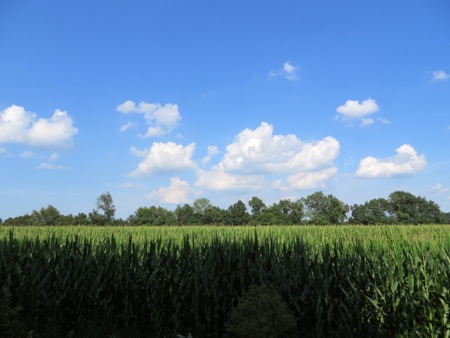After breakfast served on the front porch of the White Inn in the village of Freedonia, we got back on Interstate 90 and started driving west. We drove through the hills of western New York state and northwestern Pennsylvania and the Western Reserve of Ohio, the waters of Lake Erie (elevation 570 feet above sea level) invisible somewhere off to our right.
After we got through the sprawl of Cleveland, the land flattened out, and we felt that we were in the true Midwest: a less dramatic landscape than the northeast, one that is best appreciated when seen from close at hand. For when the Midwest is seen close at hand, you can see the details that make it charming: creeks and small rivers at the bottom of gullies and ravines, hedgerows and small patches of woodlands nestling in among fields of corn and soybeans, hundred year old farmhouses turned into residences while the surrounding fields have been bought up by agribusiness, old barns falling into quaint and attractive disrepair. Even the industrial buildings that punctuate the landscape, and the high tension lines that tie industry together, and the mile-long freight trains loaded with containers being shipped across the continent look almost attractive, if not quaint, under the gentle clouds and high-arching blue sky.
Carol had some business that she had to take care of during business hours today, so we stopped at two or three different rest areas in Ohio and Indiana so she could use the free wifi connections. I started eating some blueberries at one rest area in Ohio, and thought about how I had picked those blueberries in Massachusetts two days ago with my friend Will, on the farm where four or five generations of his family have lived. We walked along the neatly mowed paths between the blueberry bushes, which grew six to nine feet high, the branches thick with berries, mostly green berries, but plenty of ripe ones for us to pick, and either put in the plastic containers that hung around our necks or pop in our mouths. We picked two gallons of berries while we caught up with each other’s lives: health problems with our siblings, what his children are doing, how our parents are doing, etc.
Before we started picking, I told Will and his wife about the invasive Asian fly that moved into southern New England last year and decimated the blueberry crops for many growers in New Hampshire. I told them how the flies lay their eggs in the berries, and when the farmers get the berries to market, sometimes they find maggots crawling out of the berries; not an appetizing sight for potential buyers. Their eyes got big — it’s not often that you actually see someone’s eyes get big, but theirs did — as they heard about such a devastating pest. Blueberries have been an easy crop to grow in New England, since they evolved here; as opposed to apple trees, which evolved elsewhere, are troubled by native New England pests, and require lots of care.
I had heard about these invasive flies just a couple of days earlier, on Firday, when Carol and I went up to Apple Annie’s orchard in Brentwood, New Hampshire, so that Carol could look at a composting toilet that was malfunctioning. Carol was fascinated because it was a composting toilet that she had never seen before. I was fascinated to hear Laurie tell about the invasive flies, which she had learned about in a course she took to re-certify for her pesticide certification. She said they prefer red fruits, so rasberries are even more vulnerable — raspberries, which used to be yet another relatively pest-free crop in New England.
So I ate my New England blueberries in a rest area in Ohio, thinking that this might be the last easy crop of blueberries grown in my home town. Who knows why that Asian fly finally chose last year to arrive in New England. There are too many human beings everywhere, prying into niches in ecosystems where they don’t belong, moving species from one ecosystem to another at an alarming rate, and warming up the planet so that certain invasive species suddenly have to potential to disrupt native species. I would not be upset if nine-tenths of all humans died off suddenly, and I’m willing to be one of them — but I’m only willing to be one of them if we really get rid of nine-tenths of human beings; although I guess I could settle for a seven-eighths mortality rate.
We stopped again at a rest area in Indiana, where Carol and I took a long walk out through the employees’ parking lot and down a country road. On our right hand side was a corn field. It was not a field of sweet corn, grown to be sold at roadside stands and eaten as corn-on-the-cob. Carol recalled how we had once had a housemate who talked about “cow corn,” tough corn sold for cattle fodder. I said that there was a good chance this wasn’t even cow corn, but rather industrial corn bred to serve as the raw materials for chemical processes that produce ethanol, high-fructose corn syrup, corn oil, corn steep liquor, polylactic acid used to make corn-based plastics, and other industrial products.

On our left hand side was a patch of woodlands, covering at least twenty acres, that made the air feel twenty degrees cooler. We noticed black splotches on the road, and realized that mulberry trees hung over us. We picked as many ripe mulberries as we could reach reach, and ate them, the sweet elder-y taste a perfect complement to a hot humid afternoon.
